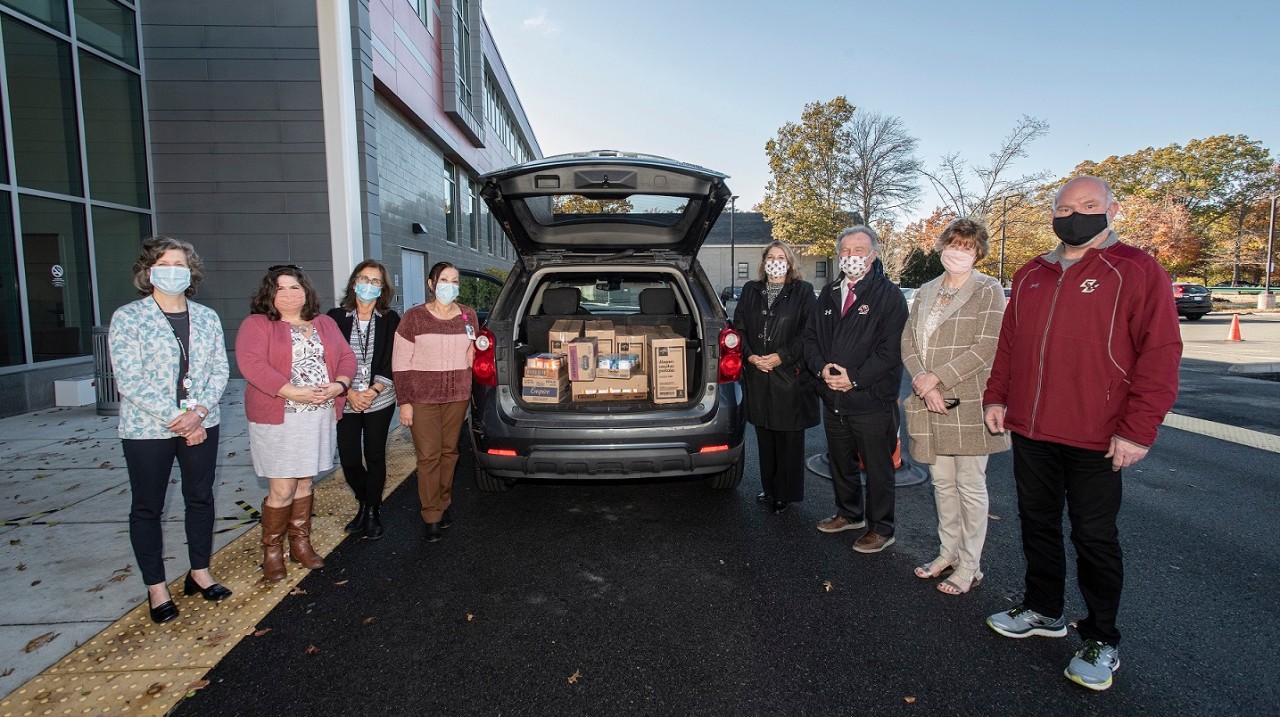It all began about eight months ago, according to Vice President for Governmental and Community Affairs Thomas Keady, when he was driving through Allston and noticed a long line of people stretching down a sidewalk.
Curious, he pulled his car over to find out what was going on. He learned that the people were waiting for food, which the Brazilian Worker Center—a non-profit that supports workers’ struggles around issues of workplace rights and immigration—has been distributing every week since the COVID-19 pandemic began.
Keady decided that Boston College needed to help.
“When you see people standing in line, it hits you how bad the economy is and how tough it is to make ends meet,” recalled Keady. “We’re part of the community. We should be doing this; it’s who we are.”
Since then, the Boston College Office of Governmental and Community Affairs has facilitated the regular delivery of food, grocery store gift cards, diapers, baby formula, and other essential items to community organizations serving Bostonians.

Representatives of Boston College deliver diapers and formula to the Charles River Community Health Center in Allston. L-R: Elizabeth Browne, Charles River Community Health CEO; BC Neighborhood Center Director Maria DiChiappari; Beatriz Lopes and Alicia Castro of Charles River Community Health; Government Relations Director Jeanne Levesque; Vice President for Governmental and Community Affairs Tom Keady; BC Neighborhood Center Office Manager Catherine Sullivan, and Community Affairs Director Bill Mills. (Photo by Lee Pellegrini)
From March through August, BC Dining Services and Governmental and Community Affairs prepared and delivered approximately 1,000-1,500 meals per week to food pantries around the city. They also provided boxed lunches for the Boston Fire Department’s Teen Fire Academy and ice cream for summer day camps at the West Suburban YMCA and the John M. Barry Boys and Girls Club.
In addition, $125,000 from the Boston College Neighborhood Improvement Fund, which provides grants for projects benefiting the Allston-Brighton neighborhood, was used to purchase food, diapers, and grocery store gift cards. These items have been delivered to different locations each week, including the Allston-Brighton Diaper Pantry, the Brazilian Worker Center, the Family Nurturing Center, Charles River Community Health Center, the Martha Eliot Health Center, and the West End House. The funds were also used for a donation to the Boston Resiliency Fund, the City of Boston’s effort to provide essential services to Boston residents whose health and wellbeing are most immediately impacted by the coronavirus pandemic.
The University also created the Community Fund Essential Services Grant program, which awarded $40,300 to 18 Allston-Brighton organizations providing direct services to Allston-Brighton residents.
University President William P. Leahy, S.J., contributed $25,000 from his office’s budget to purchase baby formula for the Charles River and Martha Eliot Health centers after learning of the great need within the community.
BC Procurement Services helped to order diapers at the best price, and Facilities Management arranged storage space for the 161,000 diapers when they were delivered; Governmental and Community Affairs and the BC Neighborhood Center delivered them each week in what Keady called “a great team effort.”
“Boston College has been amazing,” said Brazilian Worker Center Executive Director Natalicia Tracy. “We’ve been able to take this crisis and come together in collaboration in a unified way to support the community.”
Tracy said her organization felt compelled to increase their focus on direct aid during the pandemic because so many people who shared homes were getting sick and because many people were laid off and had to use their financial reserves.
“Many have seen this as a lifeline for them,” said Tracy. “We want to make sure that people who are used to providing for themselves and for their families, are supported in this moment of crisis.”
With winter approaching and continuing concerns about the pandemic and its social and economic impact, Keady said BC is ready to step up its efforts where and when needed.
“We can always do more,” he said. “We’re not done.”
Christine Balquist | University Communications | November 2020



